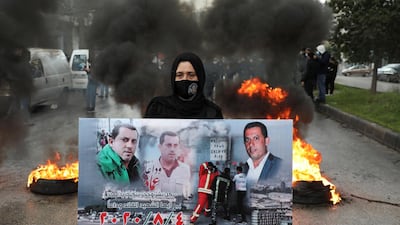Lebanon’s caretaker justice minister has appointed a new lead investigator to look into the massive explosion at Beirut's port last August that killed more than 200 people.
Judge Tarek El Bitar's appointment late on Friday came a day after the supreme court ruled to remove his predecessor Judge Fadi Sawan from the case. Mr El Bitar's appointment was swiftly approved by the High Judicial Council, in sharp contrast to the bickering that surrounded the appointment of his predecessor.
The court’s decision to remove Mr Sawan from the investigation followed a request filed by MPs and former ministers Ali Hassan Khalil and Ghazi Zeaiter, whom Mr Sawan had charged last December with criminal negligence over the blast, along with caretaker Prime Minister Hassan Diab and former minister Youssef Finianos.
All four politicians refused to be questioned by Mr Sawan, arguing that he had no authority to indict them under the constitution, which protects members of parliament and ministers from prosecution for decisions related to their work.
The supreme court’s decision sparked anger among relatives of the blast victims who fear the investigation has been politicised.
“Red lines have been set: you cannot charge politicians,” Aya Majzoub, Lebanon researcher at Human Rights Watch, said on Twitter. “This charade needs to end. We need answers and Lebanon has shown it is incapable of providing them.”
Six months after the blast, which destroyed thousands of properties across the capital and wounded more than 6,000 people, it remains unclear who owned the huge stockpile of explosive chemicals that detonated on August 4, or why it was left sitting at the one of the region’s busiest ports for more than six years with the knowledge of the country’s security agencies.
The stalled investigation into the blast prompted calls for an international probe. The Lebanese Forces, one of the country’s major parties, said its lawmakers would soon file a petition to the UN Secretary General to demand the formation of an international fact-finding commission.
"No one will convince us that any local investigation will lead to any serious conclusion regarding the port crime,” party leader Samir Geagea said.
The investigation has been marred by political tension and controversy amid reports linking the explosive chemicals to businessmen close to Syrian President Bashar Al Assad’s regime.
The reports cast doubt over the final intended recipient of the chemicals.
Suspicions were raised further when Mr Diab said late last year that the FBI had found that less than a quarter of the chemicals claimed to have been responsible for the blast had actually exploded.
Mr Diab, who previously said the blast involved the detonation of 2,700 tonnes of ammonium nitrate, later backtracked on his comment, saying it was based on unofficial reports.
Mr Diab’s indictment fuelled tensions between President Michel Aoun, the country’s highest-ranking official, and prime minister-designate Saad Hariri, who called the indictment an “attack” on the post of premier, a position reserved for Sunni Muslims under Lebanon's power-sharing system.
The investigation by Mr Sawan also drew criticism from Parliament Speaker Nabih Berri of the Amal party and its ally, the Iran-backed armed group Hezbollah. Earlier this month, Hezbollah said it was suing a former lawmaker and a website affiliated with the Lebanese Forces for defamation after they blamed the explosion on the group.
The political tensions surrounding the investigation, against the backdrop of regional tensions between Iran and its US-allied regional rivals, have further complicated the formation of a new government to replace Mr Diab’s Cabinet, which resigned after the explosion.
The explosion has caused billions of dollars in estimated damages, compounding one of Lebanon's worst financial crises since the end of the civil war in the 1990s.












